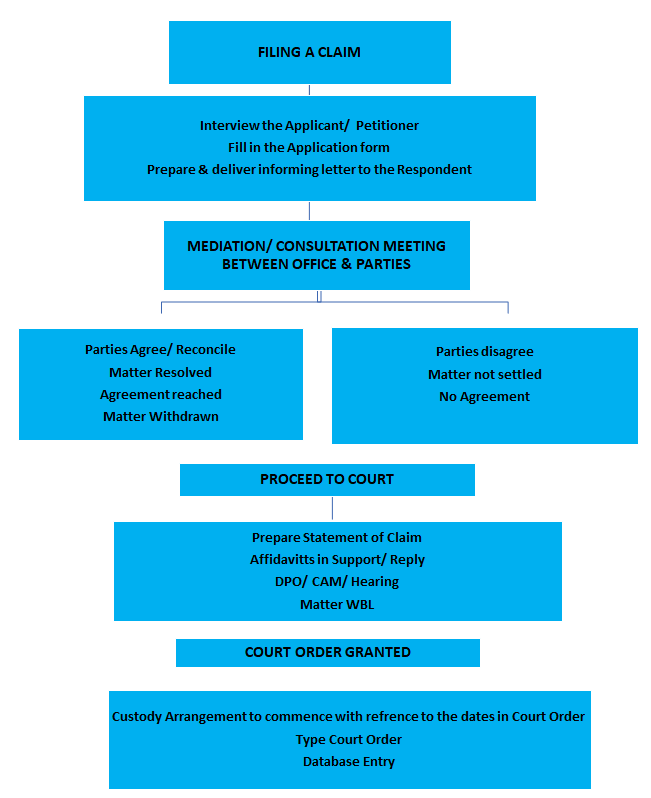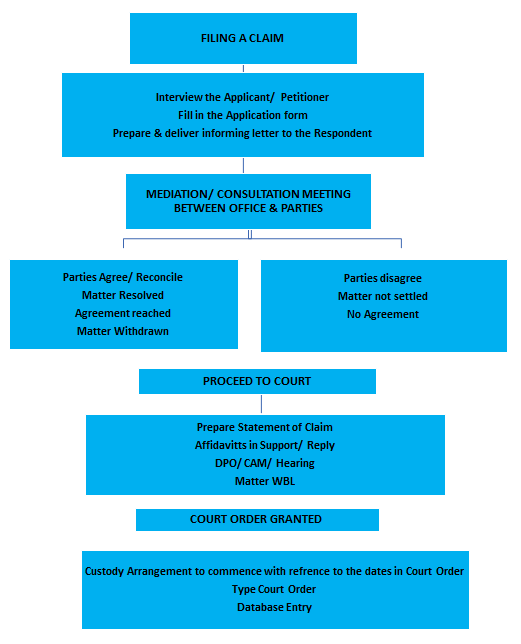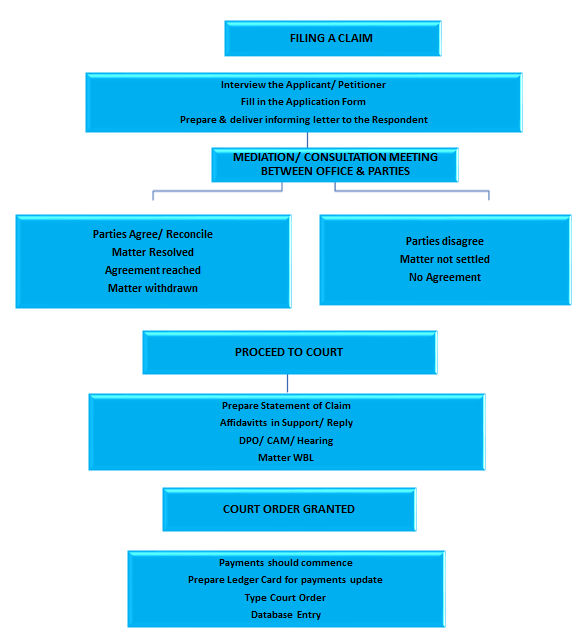Objective
To conduct conciliations/consultations on Affiliation, Custody and Maintenance for destitute persons as well as divorce; and to prosecute and effectively enforce Court Orders.
Other Sections
Core Functions
- To conduct conciliations/consultations on Affiliation, Custody and Maintenance for destitute persons as well as divorce; and to prosecute and effectively enforce Court Orders.
Governing Legislation
- Maintenance and Affiliation Act 1987
- Maintenance and Affiliation Amendment Act 2010
- Alternative Dispute Resolution Act 2007
- Immigration Act 1967
- Family Safety Act 2013
- Criminal Procedure Act 1960
- Divorce and Matrimonial Act 1967
- Divorce and Matrimonial Amendment Act 2010
Application Requirements
- Provide ID for confirmation of identity
- Marriage certificate if married
- Birth certificates of the child/children
Who Can Apply?
- Destitute persons result of dissolution of marriage
ii. husbands
- Fathers requesting for access to the children who are in custody of the mother
- Anyone who feels he/she needs protection
Services Provided
- Resolve matters
- Ensure children/wives are being provided for
- Clarity on the duties and responsibilities of parents under the Act
- Maintenance will represent the Applicant in Court
- Enforce Court orders
- Update payments of maintenance according to court orders
- Conduction visitations to ensure the well being of the children
- Non compliance of court orders is considered a criminal offence (Contempt of Court)
Types of Applications That Can Be Lodged
- Application for Affiliation, Maintenance and Custody of children
- Application for Maintenance & Custody of children
- Application for Maintenance of children and married wife
- Application for interim custody order of child8 months and under taken away from mother without consent
- Application for children’s/child’s Custody only
- Application for Maintenance of married wife who is destitute
- Application for Protection Order
- Application for Divorce where both parties agree
Process For All Types Of Applications
- Applicant must lodge application (Application for Protection Order can be represented)
- Applicant fill in application form with the assistance of the Maintenance officer
- Officer to prepare letter to inform respondent about the date, time and venue for consultation/pre-court mediation
- Officer to conduct consultation meeting/pre-court mediation;
- Mutual agreement reach outside of court
- Matter resolved parties request to withdraw matter
- No agreement, proceed to court.
- Officer to prepare matter for court
- Officer to monitor and enforce court order
The first step is to apply for an Interim Protection Order. This is an Order made by the Family Court to protect people from domestic violence where the Court is satisfied that there is sufficient evidence that someone is committing, or has committed an act of domestic violence on you or any member of your family and you or a family member is likely to be either physically or sexually assaulted as a result of such domestic violence if this order is not issued immediately.
It is an order for your protection and for the protection of your children from a violent person.
You can apply for a Protection Order if you are now, or used to be, in a domestic relationship with a person who is being violent towards you. Domestic relationship covers;
(a) if you are or were married to that person, whether in accordance to law, custom or religion;
(b) you live or lived together with that person in a relationship in the nature of marriage, although you are not, or were not, married to each other;
(c) you are the parents of a child or are persons who have or had parental responsibility for that child;
(d) you are family members related by blood or marriage;
(e) you are family members related by legal or customary adoption;
(f) you are or were in an engagement, courtship or customary relationship, including an actual or perceived intimate or sexual relationship of any duration with that person; e.g. girlfriend/boyfriend relationship; or
(g) you share or recently shared the same house or home with that person.
Lawyers, Village Representatives, Child Welfare Officers, counsellors, health service providers, social workers or teachers or any other persons approved by the Court can also apply for protection orders on behalf of another person. The application however shall be brought with the written consent of that other person, except where that other person is:
(a) a child; (anyone under the age of 18 years)
(b) suffering from a mental illness;
(c) in a coma and has been unconscious for a period exceeding 6 hours; or
(d) is a person whom the Court reasonably considers unable to provide the required consent.
Any child, or any person on behalf of a child, may apply to the Court for a protection order without the assistance of a parent, legal guardian or any other person.
Domestic violence covers a multitude of physical and psychological abuse.
Under the Family Safety Act 2013 domestic violence means:
(a) physical abuse; (means any act or threatened act of physical violence, injury, torture, or inhumane punishment towards a complainant, e.g. punching, slapping or kicking);
(b) sexual abuse; (any kind of sexual contact you don’t agree to);
(c) emotional, verbal and psychological abuse; (means a pattern of degrading or humiliating conduct towards a complainant, including:
(a) repeated insults, ridicule or name calling;
(b) repeated threats to cause emotional pain
(c) the repeated exhibition of obsessive possessiveness or jealousy;
(d) intimidation; (means threatening which makes you scared),
(e) harassment; ― (means engaging in a pattern of conduct that induces the fear of harm to a complainant including:
(a) repeatedly watching or loitering outside of or near the building or place where the complainant resides, works, carries on business, studies or happens to be;
(b) repeatedly making calls or texts by telephone, mobile phone, internet (skype) or by any other technological means, or inducing another person to make calls or texts by telephone or mobile phone to the complainant, whether or not conversation ensues;
(c) repeatedly sending, delivering or causing the delivery of radio messages, letters, telegrams, packages, facsimiles, electronic mail or other objects to the complainant.
(f) stalking; (means repeatedly following, pursuing, or accosting the complainant);
(g) any other controlling or abusive behaviour towards a complainant where such conduct harms, or may cause imminent harm to, the safety, health or wellbeing of the complainant.
Affiliation
Adjudging any person to be the father of a child(ren) with whose mother such person has not inter-married. Affiliation Order – a state in which the Court declares any person (or man) to be the father of a child(ren) wherein he has not legally married the mother nor is he in a current relationship with her. Maintenance and Affiliation Act 1967, Section 9 and 10
Custody And Access
Where the Court shall award primary custody of a child to a parent or guardian, in the best interest and welfare of the child. Maintenance and Affiliation Act 1967 Subsection 12A, Infants Ordinance 1961 Section 3 and 4
Interim Order
Temporary arrangement until the final judgment given by the Courts. Maintenance and Affiliation Act 1967, Part 5 and 6
Interim Maintenance Order – if deemed appropriate by the Judge, the respondent will be ordered to pay a sum towards the applicant until the final determination of the case.
Interim Custody Order – if a child 12 months or less of age is removed from the mother during a custody case, the mother (Applicant) can make an Interim Custody request whereupon the approval from the Registrar the child will be returned to the mother for a period of seven (7) days to await the final hearing date. Both parties are advised to come to an agreement during this 7-day period.
Interim Protection Order (Family Safety Act 2013, section 5) – order made by the Family Court to protect people from domestic violence which will be served onto the Respondent with; a copy of the application, any other sufficient evidence to support the claim that an act of violence has been committed against the Applicant and a date of Court appearance.
Maintenance
Sufficient financial assistance provided by the respondent parent, usually not involved in the day-to-day care of the child, for the necessities of the destitute parent. Maintenance and Affiliation Act 1967 Part 3, 4 and 5, Divorce and Matrimonial Causes 1961 Section 22 to 25
Divorce
The irreversible breakdown of a marriage that is legally granted upon the agreed consent of both parties involved. Divorce and Matrimonial Act 1961, Section 7(g)
Enforcement Action
- Fail to provide maintenance for their spouse and/or children
- Fail to pay money under a maintenance order wherein a Disobedience charge will be prepared after 14 days of informing the Respondent
- Attempt to leave Samoa after a maintenance application but before a maintenance order is granted by the Court
- Attempt to leave Samoa while there are outstanding payments under a maintenance order
- Attempt to leave Samoa while failing to provide maintenance for their spouse and/or children
- Ensure that a Protection Order is imposed in that the Respondent must at all times be 10 to 20 meters away from the Applicant.
- Weekly visitations to monitor the maintenance and/or custody arrangements of applicants. The Respondent is only contacted under special circumstances such as a complaint from the applicant.




